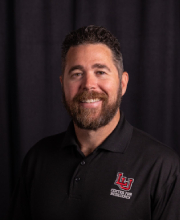Teaching
Nicholas Brake, Ph.D.
Associate Professor


Dr. Brake is a very passionate and experienced civil engineering educator who has had the opportunity to teach a wide array of courses to students from multiple disciplines and academic ranks. He has taught at the freshman level all the way up to the doctoral level. Dr. Brake has taught and/or developed nine different courses:
|
Undergraduate Courses |
Graduate Courses |
|
CVEN 1101 Intro to Civil Engineering CVEN 2301 Statics CVEN 3200 Engineering Material Systems CVEN 3340 Structural Analysis CVEN 4110 Professional Seminar CVEN 4380 Reinforced Concrete Design I ENGR 4301-11: Undergraduate Research |
ENGR 5333 Adv. Pavement Analysis and Design CVEN 5300 Advanced Structural Analysis CVEN 5311 Structural Dynamics CVEN 5300 Adv. Structural Analysis |
Dr. Brake firmly believes in educating students with engaging and collaborative student-centered curricula that builds interpersonal rapport between students and the instructor. He actively integrates engineering design into lower academic-level courses that traditionally are analysis-heavy and do not focus on design principles.
He was awarded the Presidential Faculty Fellowship for Teaching Innovation award in 2015 for integrating the engineering design process into a freshman hands-on introduction to engineering experimental course by having students design and build 3D printed objects that require combined uses of computational software, spreadsheets, simplified engineering analytical design equations, hands-on building, testing and re-design processes.
Dr. Brake has also integrated collaborative design-build projects into large population sophomore engineering courses by utilizing CAD, computational software to deepen students' understanding and increase their confidence and motivation. In his junior-level classes, he integrates a full-fledged pre-capstone civil engineering design project that requires students to design, build and test glue-laminated timber beams and requires the use of structural analysis software and building codes.
These projects have been shown to holistically deepen their fundamental understanding of the working principles, and shown to significantly increase student engineering design confidence, motivation, and design effectiveness.
Summary of Active Learning Activities Integrated into Dr. Brake's Courses:
FRESHMAN: CVEN 1101 Introduction to Civil Engineering. Students were introduced to Civil Engineering. The course included 5+ industry guest lectures, an introduction to numerical analysis with engineering computational tools and engineering design. Course implements active learning, project-based learning, vertically integrated senior-freshman team-based learning, 3D printing-based design-build-test projects. Results: engineering interest increased (p<0.05), design confidence increased: (p<0.005) and design motivation increased (p<0.1).
Design, Build and Test:

SOPHOMORE: CVEN 2301: Statics. Introduced a micro 3-week project-based learning 3D printing-based design-build-test project in a traditional instructor-centered course. This was done to increase design confidence, teach students how to utilize three-dimensional cad in civil engineering applications, and taught students how to build a poster for oral presentation. Results: engineering design confidence increased (p<0.005).

JUNIOR: CVEN 3200: Introduced a project-based learning design-build-test project that utilized realistic constraints and building codes. The engineering design process was emphasized. Results: engineering design confidence design increased (p<0.005).
BROADER IMPACT: Students who completed the design-build-test sequence have been shown to perform significantly better on their senior capstone design project compared to a control population (p<0.005).

EXTRA-CURRICULAR ACTIVITIES: ASCE Concrete Canoe and Steel Bridge Team Technical Adviser. I serve as the technical adviser to the ASCE student chapter. Students apply their engineering knowledge to solve problems with realistic constraints through project-based learning and design-build-test activities.

K-12 EDUCATOR OUTREACH: As part of a National Science Foundation Project, we are training high school educators to integrate engineering design and manufacturing into the high school curriculum. We visited manufacturing plants, conducted research and developed teaching workshops.

K-12 STUDENT OUTREACH: LITE and LITE Senior Summer Camp: I have been a part of the LITE Engineering Summer Camp for local middle and high school students at Lamar University for the past four years. After completing the camp, the students were found to have more interest in pursuing engineering careers.

Dr. Brake is currently exploring the use of online tools and the integration of online social communities of practice to incentivize peer teaching and mentoring using the university productivity suite Microsoft Office365: Microsoft OneDrive, Microsoft Yammer, Microsoft OfficeMix, Microsoft Sway and Microsoft OneNote. A community of practice is a mutual enterprise that is well understood and continually renegotiated by its members that creates a uniquely organic resource-sharing social entity.
Dr. Brake hopes to create an environment where students continuously meet face-to-face or online, and they, with the instructor, support the educational ecosystem by supplying new content that serves as instructional media for other students. This creates intrinsic and extrinsic motivation within the student population and supports learning through feedback, reflection and student coaching/teaching.

Dr. Brake has served as the technical faculty adviser for the student ASCE steel bridge and concrete canoe teams and has traveled with the student teams to various Texas-Mexico Regional Competition locations, including: Arlington, TX., Corpus Christi, TX., Austin, TX. and Tyler, TX.
Dr. Brake also served as faculty adviser for Engineers Without Borders and assisted the students with community fundraising events and provided technical advice pertaining to their percolation field design for a Catholic school in Belize. Dr. Brake believes that extra-curricular involvement in engineering clubs, societies, and organizations is a critical component of the student educational experience and is a strong advocate for student participation in these activities. Students gain experience and can apply their knowledge to solve realistic problems which will deepen their understanding of the working principles and supplement the experiential learning experience.
Dr. Brake has also served as an undergraduate mentor to five students, two of whom were awarded OUR research grants of $1,500 to conduct research in the areas of advanced cementitious materials and damage diagnostic techniques under his guidance. He believes a research experience will deepen students' understanding and prepare them for graduate studies.